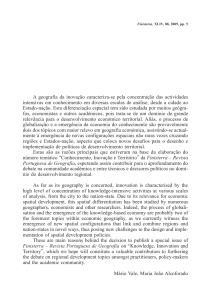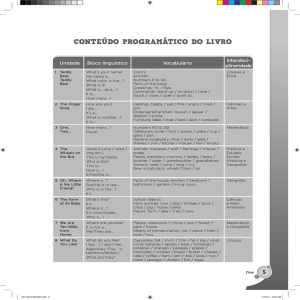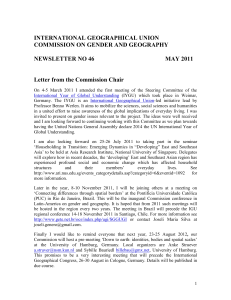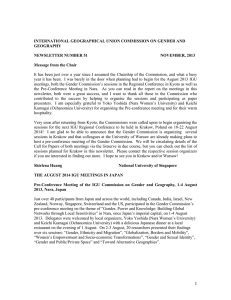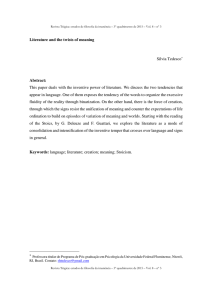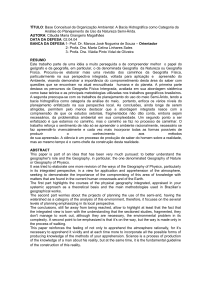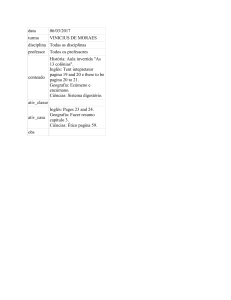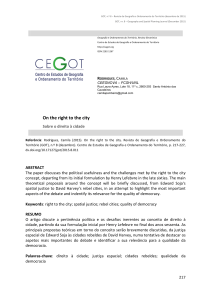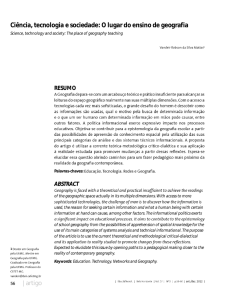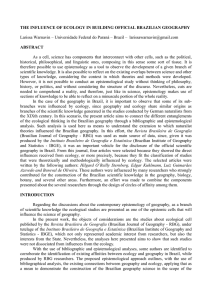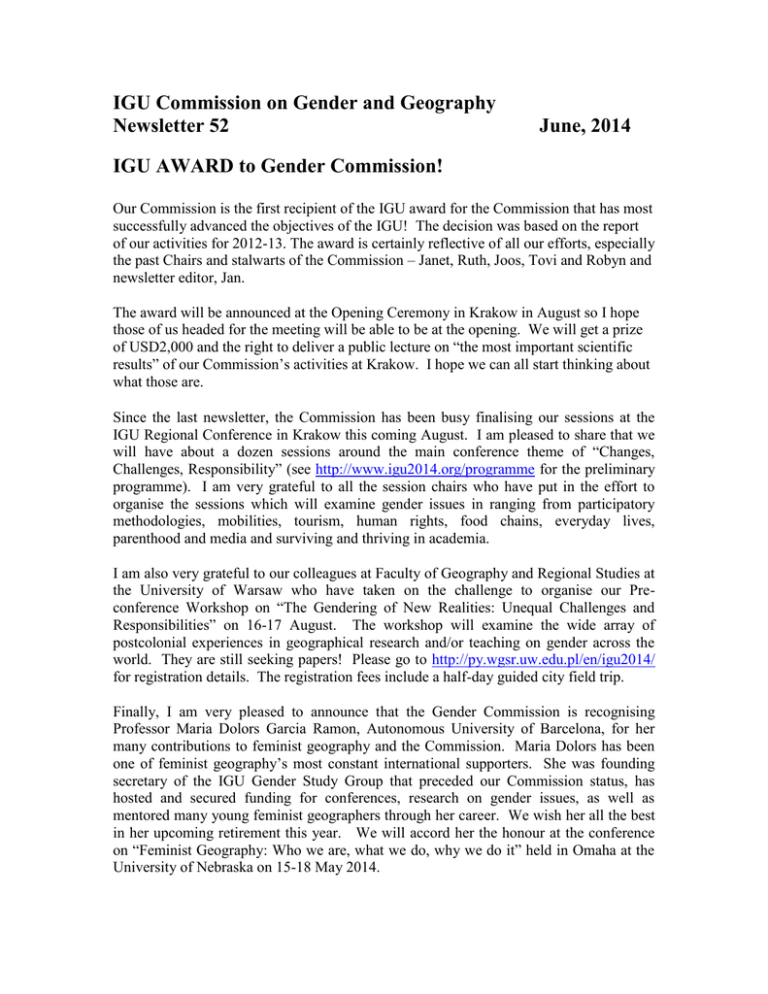
IGU Commission on Gender and Geography
Newsletter 52
June, 2014
IGU AWARD to Gender Commission!
Our Commission is the first recipient of the IGU award for the Commission that has most
successfully advanced the objectives of the IGU! The decision was based on the report
of our activities for 2012-13. The award is certainly reflective of all our efforts, especially
the past Chairs and stalwarts of the Commission – Janet, Ruth, Joos, Tovi and Robyn and
newsletter editor, Jan.
The award will be announced at the Opening Ceremony in Krakow in August so I hope
those of us headed for the meeting will be able to be at the opening. We will get a prize
of USD2,000 and the right to deliver a public lecture on “the most important scientific
results” of our Commission’s activities at Krakow. I hope we can all start thinking about
what those are.
Since the last newsletter, the Commission has been busy finalising our sessions at the
IGU Regional Conference in Krakow this coming August. I am pleased to share that we
will have about a dozen sessions around the main conference theme of “Changes,
Challenges, Responsibility” (see http://www.igu2014.org/programme for the preliminary
programme). I am very grateful to all the session chairs who have put in the effort to
organise the sessions which will examine gender issues in ranging from participatory
methodologies, mobilities, tourism, human rights, food chains, everyday lives,
parenthood and media and surviving and thriving in academia.
I am also very grateful to our colleagues at Faculty of Geography and Regional Studies at
the University of Warsaw who have taken on the challenge to organise our Preconference Workshop on “The Gendering of New Realities: Unequal Challenges and
Responsibilities” on 16-17 August. The workshop will examine the wide array of
postcolonial experiences in geographical research and/or teaching on gender across the
world. They are still seeking papers! Please go to http://py.wgsr.uw.edu.pl/en/igu2014/
for registration details. The registration fees include a half-day guided city field trip.
Finally, I am very pleased to announce that the Gender Commission is recognising
Professor Maria Dolors Garcia Ramon, Autonomous University of Barcelona, for her
many contributions to feminist geography and the Commission. Maria Dolors has been
one of feminist geography’s most constant international supporters. She was founding
secretary of the IGU Gender Study Group that preceded our Commission status, has
hosted and secured funding for conferences, research on gender issues, as well as
mentored many young feminist geographers through her career. We wish her all the best
in her upcoming retirement this year. We will accord her the honour at the conference
on “Feminist Geography: Who we are, what we do, why we do it” held in Omaha at the
University of Nebraska on 15-18 May 2014.
As this academic year draws to a close, I wish you all a productive summer and hope to
see you in Krakow and Warsaw!
Shirlena Huang (National University of Singapore)
Chair, IGU Gender and Geography Commission
News from Around the World
Congratulations to our colleagues at the University of Waikato, New Zealand, who have
received major recognition. Robyn Longhurst has been appointed as the University’s
Pro-Vice Chancellor Education beginning January 2014 and also received the
university’s 2013 postgraduate supervision excellence award. Lynda Johnston has
received one of the University’s four Research Excellence Award. which recognized her
community impact. It acknowledged more than 20 years of informing debate and shaping
community opinions on issues such as marriage equality, queer identity, and sexual
health and well- being. Lynda and Robyn were also both honored at the 2014 Association
of American Geographers meeting. Lynda was awarded the Jan Monk Service Award of
the Geographic Perspectives on Women Specialty Group while Robyn was also present
to accept that award for 2013 which she had been unable to accept in person last year.
On Australia Day, January 26, 2014, Ruth Fincher (Professor of Geography,University
of Melbourne) has received a major award from the Australian government, as a
Member of the Order of Australia, It honors her significant service to education,
particularly to geography and urban studies and to national and international geographic
associations. Ruth served as a Vice-President of the International Geographical Union,
2008-2012, as Chair of the IGU Commission on Gender and Geography, 1996-2000; is
currently President of the Academic Board of the University of Melbourne, was
Executive Committee Member of the International Social Science Council, 2010-2013 ,
and has played many other roles in academia. Congratulations on this high national
honor!
A 'gender task force' has been formed in the VGDH (Association of German
Geography) to conduct a quantitative and qualitative study about the persistence of
gender inequalities in German geography departments. Additionally, the Deutscher
Geographentag has been renamed into Deutscher Kongress für Geographie in order to
respond to the 'new' reality of German geography, in which both female and male
geographers now play an important role. The old name used only the male form of
geographer (Gegographen) (which excluded female geographers - Geographinnen).
Congratulations to Anne Buttimer (Emeritus Professor, University College, Dublin) who
was awarded Lifetime Achievement Honors by the Association of American Geographers
at its 2014 Annual Meeting in Tampa, Florida, in April 2014. The award recognizes her
sustained contributions to philosophies of geography and to connecting geography and
social policies as well as recognizing her international leadership including Presidency of
the International Geographical Union (2000-2004) and Vice Presidency of Academia
Europaea.
Tovi Fenster, Tel Aviv University gave a series of talks about 'Gender and the City' at
the end of January, 2014 at the La Laguna University in Tenerife, Canary Islands.hosted
by Prof. Luz Marina Garcia Herrera who has an active group that do research on this
issue..
Dedicated to Ragnhild Lund, Norwegian University of Science and Technology and a
member of the steering committee of the IGU Commission on Gender and Geography,
the book Alternative Development: Unraveling Marginalization, Voice Change honors
her career in fostering international collaborative work in development and gender
studies. The book, edited by Catherine Brun, Piers Blaikie, and Michael Jones, is inspired
by Ragnhild’s four decades of “balancing academic life and activism with themes of
alternative development such as local knowledges and practices, poverty, gender,
environment and sustainable development, and addressing recent debates such as forced
migration, conflict, and climate change.” The volume includes an autobiographical
discussion between Ragnhild and Michael Jones on her life and career since the mid
1970s. Chapters focusing on gender themes are identified below in the section on articles
and book chapters. We congratulate Ragnhild on this tribute.volume.
Congratulations to Nazgol Bagheri (University of Texas, San Antonio) who has
received the 2013 University of Missouri-Kansas Outstanding Dissertation Award
selected from a highly competitive pool of applications by the university’s School of
Graduate Studies. Her Ph.D dissertation is entitled “Modernizing the Public Space:
Gender Identities, Multiple Modernities, and Space Politics in Tehran.” She presented on
this research at the IGU Regional Conference in Kyoto in 2013.
Congratulations to Carolin Schurr who has received the Swiss Latin American
dissertation award for my dissertation 'Performing politics, making space: a visual
ethnography of political change in Ecuador' with a 6.000 CHF prize money.
Over 60 paper and/or panels sessions at the Association of American Geographers were
sponsored or co-sponsored by the Geographic Perspectives on Women Specialty Group.
Among co-sponsoring specialty groups were Sexuality and Space, Development
Geography, Cultural and Political Ecology, Latin American Geography, Rural
Geography, and History of Geography. In addition to presenters from the United States
were also geographers from Australia, Brazil, Canada, India, the Netherlands, New
Zealand, Spain, and the U.K. A full list of sessions and abstracts can be accessed by
entering Geographic Perspectives on Women at the site for the preliminary program.
http://meridian.aag.org/callforpapers/program/index.cfm?mtgID=59
Congratulations to Karen Schwiter and colleagues who have been awarded a multi-year
grant by the Swiss National Science Foundation for the project "Anticipated parenthood
and employment trajectories. The interrelation of family and career plans of young adults
and their implications for occupational gender segregation." The project is hosted at the
Center of Gender Studies of the University of Basel and runs from June 2014 to
December 2016. Karen (University of Zurich) is currently spending a research semester
in Vancouver..
NEW BOOKS
Bradshaw, Diane (ed.) Gender Issues and Human Rights. 2013. Cheltenham, Gloucester
and Northampton, MA. Edward Elgar.
Bradshaw, Sarah. Gender, Development and Disasters. Cheltenham, Gloucester and
Northampton MA: Edward Elgar
Brun, Catherine, Piers Blaikie, and Michael Jones. 2014. Alternative Development:
Unraveling Marginalisation, Voicing Change. Farnham, Surrey and Burlington VT.,
Ashgate.
Dixon, Deborah P. and Sallie A. Marston. 2013 Feminist Geopolitics: At the Sharp End .
London and New York: Routledge.
Eriksen, Christine. 2014. Gender and Wildfire: Landscapes of Uncertainty. London and
New York. Routledge.
Fenster, T and Shlomo, O. (eds.) (2014), Cities of Tomorrow? Planning , Sustainability
and Justice Today?, Hakibbutz Hameuhad Publishers, Tel Aviv (Hebrew)
Gorman-Murray, Andrew, Barbara Pini, and Lia Bryant (eds). 2013. Sexuality, Rurality,
and Geography. Lanham MD. Rowman and Littlefield.
Heinonen, Paula. 2013. Youth Gangs and Street Children: Cuture, Nature and
Masculinity in Ethiopia. New York and Oxford: Berghahn.
Oberhauser Ann M. and Ibipo Johnston-Anumonwo. 2014. Gender and Space: Engaging
Feminisms and Development. New York: Routledge.
http://www.tandfundia.com/books/details/9780415657983.
Oso, Laura and Natalia Ribas-Mateos. 2013. The International Handbook on Gender,
Migration and Trannationalisn Cheltenham, Gloucester and Northampton, MA. Edward
Elgar.
Otto, Dianne. 2013. Gender Issues and Human Rights. Edward Elgar. Cheltenham,
Gloucester and Northampton, MA. Edward Elgar.
SPECIAL JOURNAL ISSUES
LES Online 6(1) 2014 is a special issue of ten papers from with Proceedings of the II
European Geographies of Sexualities conference. Information can be obtained from
Edward Ferreira ([email protected]).
Norsk Geografisk Tidsskrift has issued two special issues devoted to gendered mobilities:
Volume 67 (4) edited by Ragnhild Lund and Anna Karlsdottir deals with Asia and 67 (5),
2013, edited by Haldis Vallestrand, Destra Walsh, Siri Girrard and Marit Aure deals with
the North. See below for individual articles.
French, Amber and Parvati Raghuram (eds) 2013. Female Migration Outcomes II.
Gendered Analysis of the Outcomes of Migration: Research Agendas and Policy
Proposals. Volume 15, No. 2. This issue includes seven articles addresses research
agendas, policy proposals, and case studies from Asian European, African, Middle
Eastern and Canadian settings (see individual entries below).
ARTICLES AND BOOK CHAPTERS
Agyei-Mensah, and Cahrlotte wrigley-Asante. 2013. “Gender, Politics and Development
in Accra, Ghana.”in Catherine Brun, Piers Blaikie, and Micahel Jones (eds). Alternative
Development: Unraveling Marginalization, Voicing Change, Farnham, Surrey and
Burlington VT., Ashgate.
Aiello, G. Bakshi, S. Bilge, S. Hall, L. K. Johnston, L. and Pérez, K. 2013 “Here, and not
yet here: a dialogue at the intersection of queer, trans, and culture.” Journal of
International and Intercultural Communication, 6(2): 96-117.
Alfasi, N. and T. Fenster, 2013. ' Urban Justice in the 2011 Protest Movement in Israel',
Pamin: Journal of Culture, Society and Education, 64, 113-123, (Hebrew).
Andrew, Caroline., Fran. Klodawsky, and Janet Siltanen, 2013, “Soft skills and hard
prejudices: Pathways to improving recent immigrant women’s successful integration in
Ottawa, Canada”, Diversities, 15/1, pp. 67-78
Atehortúa, Juan Velasquez. 2014. Barrio women’s invited and invented spaces againist
elitisation in Chacao, Venezuela.” Antipode 46(3): 835-56.
Attanapola, Chamila t. “Ignored voices in globalization: Women’s agency in coping with
human rights violations in an export processing zone in Sri Lanka.” Catherine Brun, Piers
Blaikie, and Micahel Jones (eds). Alternative Development: Unraveling Marginalization,
Voicing Change, 135-154.. Farnham, Surrey and Burlington VT., Ashgate.
----. 2013. “Back and forth with hopes and fears.: Sri Lankans men’s narratives on
gendered mobility in transnational livelihoods.” Norsk Geografisk Tidsscrift 67(5): 21928.
Aubrey, Tim, Fran Klodawsky, and Benjamin Coulombe. 2012. “Comparing the housing
trajectories of Different Clusters Within a Diverse Homeless Population”, American
Journal of Community Psychology, 49/1: 142-155.
Aure, Marit. 2013. “The emotional costs of employment-related mobility.” Norsk
Geofrafisk Tidsskrift 67(5): 284-94.
Azmi, Farzeeha. 2014. “Impacts of internal displacemenr on women’s agency in two
resettlement communities in Sri Lanka.” Catherine Brun, Piers Blaikie, and Micahel
Jones (eds). Alternative Development: Unraveling Marginalization, Voicing Change,
243-257. Farnham, Surrey and Burlington VT., Ashgate.
Bailey, A. and S. Darak. 2013. “Spaces of disclosure and discrimination: Case studies
from India”. In P. Liamputtong (ed.), Stigma, Discrimination and Living with
HIV/AIDS-A Cross-Cultural Perspective. Springer, Dordrecht. ISBN 978-94-007-6323-4
Bailey, Marion M. “Engendering space: Ballroom culture and the spatial practice of
possibility in Detroit.” Gender, Place and Culture 21(4): 489-507.
Bailey, Marion M. and Rashad Shabazz. 2014. “Gender and sexual geographies of
Blackness: New Black cartographies of resistance and survival (part 2).” Gender, Place
and Culture 21(4): 449-52.
----. 2014. “Gender and sexual geographies of Blackness: anti—black heterotopias (part
1). Gender, Place and Culture 21 (3): 316-21.
Baldin, Talita; Brito, Rosemeire Santos. 2014. “A mulher em cena: o feminino na
tragédia grega 'Medéia'.” Revista Latino-Americana de Geografia e Gênero, 5,(1)11425.
Bartlett, Alison. 2013.”Feminist protest in the desert: Researching the 1983 Pine Gap
women’s peace camp .” Gender, Place and Culture 20 (7): 914- 26.
Basilio. Luciana., 2014.”As Educadoras e o Sistema de Ensino do Município de Porto
Velho: Uma História de Ausências. Revista Latino-americana de Geografia e Gênero, , 5
(2)209-29.
Baylina, Mireia, Anna Ortiz Guitart, and Maria Prats Ferret. Adolescència i gènere al
barri del Besòs.” In Blanca Gutiérrez , Adriana Cioccoletto (eds). 2012. Estudios
Urbanos, género y feminismo. Teorías y experiencias , Universitat Politècnica de
Catalunya i Institut Català de les Dones, Generalitat de Catalunya.: 175-90
Bélanger, Danièle and Linh Tran Giang 2013. “Precarity, Gender and Work: Vietnamese
Migrant Workers in Asia.” in Female Migration Outcomes II. 15(1).
Benwell, Ann Ferger. 2013. “ Making migration meaningful: Achievements through
deparation in Mongolia.” Norsk Geografisk Tidsskrift 67(4): 239-248.
Berjano-Rodríguez, Daniel. 2014. “¡Harka!: Del Homoerotismo a la Opresión de Género
y Raza.: Revista Latino-americana de Geografia e Gênero, 5,(2):1-18,.
Bernardes, Antonio and Benhur Costa, 2014. ““Pinós da. Microterritorializações
homoafetivas na cidade de Presidente Prudente-SP: o lazer noturno e as relações de
interface..”. Revista Cidades. UNESP: Presidente Prudente, SP.
Boivin, Renaud René. 2014.”La homofobia discriminación violencia hacia las inorias
sexuales en las urbes mexicanas. Revista Latino-americana de Geografia e Gênero, 5
(1):80Brito,Leandro Teofilo de Freitas, José Guilherme de Oliveira; and Mônica Pereira dos
Santos, 2014. “Não, Isso não é Coisa pra Homem” - Masculinidades e os Processos de
Inclusão/Exclusão em uma Escola da Baixada Fluminense – RJ. Revista Latinoamericana de Geografia e Gênero,. 5 (2)) 114-25.
Brown, Michael. 2014. “Gender and sexuality II: There goes the gayborhood.” Progress
in Human Geography 38: 452-65.
Brun, Catherine and Piers Blaikie. 2014. “Introduction Alternative Development:
Unravelling Marginization, Voicing Change” in Catherine Brun, Piers Blaikie, and
Micahel Jones (eds). Alternative Development: Unraveling Marginalization, Voicing
Change, 1-21. Farnham, Surrey and Burlington VT., Ashgate.
Buda, D. d’Hauteserre, A-M and Johnston, L. 2014: Feelings and tourism studies, Annals
of Tourism Research, 46: 102-14.
Caires, lisângela Santos Pereira de; Gomes.Almiralva Ferraz; and Santana. Weslei
Gusmão Piau 2014. “ Relações de Gênero: Uma Análise da Participação das Mulheres no
Espaço Organizacional de uma Concessionária de Veículos.” Revista Latino-americana
de Geografia e Gênero, 5 (2)126-45.
Carbó, Mónica, Mireia Baylina, and Maria Dolors Garcia Ramon,. 2013. “Women’s
ventures in a rural context: livelihood and identity.” Hagar: Studies in Culture, Poltics
and Identity 11(1): 100-20.
Caro, E,. Bailey, A. and van Wissen, L.J.G. 2014. “Exploring links between internal and
international migration in Albania. Social and economic capital, a supporting or an
impending adjustment factor? “Population Space and Place 20 (3),: 264–76
Caretta, M.A. and Börjeson, L. 2014. “Local gender contract and adaptive capacity in
smallholder irrigation: a case study from the Kenyan dry-lands.” Gender, Place and
Culture. DOI: 10.1080/0966369X.2014.885888
http://www.tandfonline.com/doi/abs/10.1080/0966369X.2014.885888#.UxV3k_l5Mb1
----. 2014. '”Credit plus’: Microcredit schemes: a key to women´s adaptive capacity'”
Climate and Development. DOI: 10.1080/17565529.2014.886990
http://www.tandfonline.com/doi/full/10.1080/17565529.2014.886990#.UxV3Ffl5Mb0
Cé, João Pedro; Cardoso, João Gabriel, Maracci Silveira. Barcinski, ARCINSKI,
Mariana; Pizzinato, Adolfo. 2014. “Em Casa que Mulher Manda, até Galo Canta Fino:
Análise da Construção Midiática da Personagem Dilma Rousseff.” Revista Latinoamericana de Geografia e Gênero, 5(2): 175-88.
Chant, Sylvia . 2014. “The Informal Economy in Cities of the South.” In Vandana Desai
and Robert Potter (eds), The Companion to Development Studies, 3rd edition (London:
Hodder and Stoughton): 200-7.
Choi, Eunyoung, 2014. “North Korean women’s narratives of migration: Challenging
hegemonic discourses of trafficking and geopolitics.” Annals of the Association of
American Geographers 104(2): 271-79.
Costa, Benhur Pinós da. 2014. “Práticas espaciais de 'pegação' homoerótica: o caso dos
banheiros públicos nas cidades de Presidente Prudente -SP e Vitória da Conquista - BA.
Revista Latino-americana de Geografia e Gênero, 5 (1)):52-79.
Cupples J and Glynn K 2014. “Indigenizing and decolonizing higher education on
Nicaragua’s Atlantic Coast.” Singapore Journal of Tropical Geography 35(1): 56-71
Cupples J and Glynn K. 2014. “The mediation and remediation of disaster: Hurricanes
Katrina and Felix in/and the new media environment.’ Antipode: A Radical Journal of
Geography 46(2): 359-81.
Delgado, Cecília Maria Neves. 2014. “O género como instrumento de definição de
cidades mais equitativas: constrangimentos e oportunidades.” Revista Latino-americana
de Geografia e Gênero. 5(1): 66-72.
DeLyser, Dydia and Wendy S. Shaw. 2013. “For menopause geographies.” Area 45(4):
504-06.
Devasahayam, Theresa W. 2013. Making the Most of Remittances: Obligations,
Aspirations, and Precarity among Indonesian Women Migrants in Singapore ” in Female
Migration Outcomes II. 15(1).
Dinis, Nilson Fernandes. 2014. “O amor entre mulheres: a tolerância esconderia mais
preconceito?” Revista Latino-americana de Geografia e Gênero, 5(1): 142-51.
Dixon, Deborah P. 2014. “The way of the flesh.: geopolitics and the weight of the
future.” Gender, Place and Culture 21 (2): 136-151.
Dominguez-Mujica, Josefina and Rosalia Avila-Tàpies. 2013. “ The in-between lives of
Japanese immigrants in Las Palmas de Gran Canaria, Spain.” Gender, Place and Culture
20 (7): 896-913. 46(1): 229-45.
Dowler, Lorraine, Dana Cuomo and Nicole Laliberte. 2014. “Challenging ‘The Penn
State Way.” A feminist response to institutional violence in higher education.” Gender,
Place and Culture 21 (3): 387-94.
Drah, Bright B. 2014.”Queen mothers, NGOs and orphans: Transformations in traditional
women’s political organizationin an era of HIV and orphanhood in Manya Klo, Ghana.”
Norsk Geografisk Tidsskrift 68(1) 10-21.
Dutt, Sohini and Bimal Kanti Paul. 2014. “Factors influencing willingness to comply
with HIV/AIDS prevention measures by female college students in Kolkata, West
Bengal, India.” Geojournal 79(1): 113-26.
Eguiluz, Itzel. 2014.” Emerging Adulthood, Regular Migration and Sexuality: Latin
American Immigrants in Madrid.” Revista Latino-americana de Geografia e Gênero,
Ponta Grossa, 5(2):59-64.
.
Eide, Ingrid. 2014. “Implementing international consensus on women in development:
Context, policy and practice.” In Catherine Brun, Piers Blaikie, and Micahel Jones (eds).
Alternative Development: Unraveling Marginalization, Voicing Change, 87-97. Farnham,
Surrey and Burlington VT., Ashgate.
Ekera, Michael. 2013. “ “’Pounding dirt all day’: Labor, sexuality, and gender in the
British Columbia reforestations sector.” Gender, Place and Culture 20 (7) 876-95.
Emple, Hanna and Helen Hazen. 2014. “ Navigating risk in Minnesota’s birth landscape:
Care providers’ perpsectives.” ACME 13(2): 352-71.
Eriksen, Christine.2014. “Gendered risk engagement: Challenging the embedded
vulnerability, social norms, and power relations in conventional Australia bushfire
education.” Geographical Research 52(1) 23-33.
------.. (2014) ‘Gendered Risk Engagement: Challenging the Embedded Vulnerability,
Social Norms and Power Relations in Conventional Australian Bushfire Education’,
Geographical Research, 52(1): 23-33
----. (2013) ‘War Cry’, Current Conservation, 7(1): 6-37.
Eriksen, Christine and Don Hankins (2013) ‘Gendered Dimensions of Aboriginal
Australian and California Indian Fire Knowledge Retention and Revival’, Current
Conservation, 7(1): 22-26.
Eriksen, Christine and Lesley Head, (2014) ‘Guest Editorial: Geographical Fire
Research in Australia – Review and Prospects’, Geographical Research, 52(1): 1-5.
Eriksen, C. & Prior, T. (2013) ‘Defining the Importance of Mental Preparedness for Risk
Communication and Residents Well-Prepared for Wildfire’, International Journal of
Disaster Risk Reduction, 6, pp.87-97.
Evans, Sarah,, Innes Keighren, and Avril Maddrell. 2014. “Coming of age?: Relfections
on the centenary of women’s admissions to the Royal Geographical Society.”
Geographical Journal 179 (4): 373-76.
Evered, Emine and Kyle T. Evered. 2013. “ “’Protecting the national body’: Regulating
the practice snd the place of prostitution in early republican Turkey.” Gender, Place and
Culture 20 (7)::839-57.
Faria, Caroline. 2014. “Styling the nation: Fear and desire in the South Sudanese beauty
trade.” Transactions of the Institute of British Geographers. 39(2) 318-30.
Fiddian-Qasmiyeh, Elena. 2014. “Transnational abductions and transnational
responsibilities? The politics of ‘protecting’ female Muslim refugees abducted from
Spain.” Gender, Place and Culture, 21 (2): 174-194.
Fiorvante, Karina Eugenia and Alfano, Mirelle. 2104. “'Marco e Benigno': cenários de
masculinidades na cinematografia de Pedro Almodóvar. Revista Latino-americana de
Geografia e Gênero, 5 (1)) 47-65.
Fossland, Trina. 2013. “Crossing borders, getting work: Skilled migrants’ gendered
labour market participation in Norway.” Norsk Geografisk Tidsskrift 67(5): 276-83.
Gerard, Siri. 2013. “Mobilities, materialities,and masculinities: Interconnected mobility
ptactices in Norwegian coastal fisheries.” Norsk Geografisk Tidsskrift 67(5): 312-19.
Glynn K and Cupples J 2014. “Negotiating and queering US hegemony in TV drama:
Popular geopolitics and cultural studies. Gender, Place and Culture (in press).
Gomes, Fernando Bertani. 2014. “Resenha: Foucault.” Revista Latino-americana de
Geografia e Gênero,. 5 (2): 244-48.
----. 2014.”Trajetórias Espaciais de Jovens do Sexo Masculino e os Agenciamentos da
Morte na Cidade de Ponta Grossa - Pr. Revista Latino-americana de Geografia e Gênero,
5 (2): 99-113;
Gomes. Fernando Bertani; and Joeseli Maria Silva. 2014. “Cenas Loucas': As
assemblages da violência de jovens do sexo masculino com envolvimento com as drogas
na cidade de Ponta Grossa – PR.”. Revista Latino-americana de Geografia e Gênero,
5,(1)):3 – 24.
Göransson, Kristina. 2013. “Manoevring the middle ground: Social mobility and the
renegotiation of gender and family obligations among Chinese Singaporeans.” Norsk
Geografisk Tidsskrift 67(4): 249-58.
Gorman-Murray, Andrew. 2014 “Home fires: Risk, vulnerability and diversity.”
Geographical Research 52 (1): 50-60.
Gress, Douglas R. and Jaeyon Poek. 2014. “Differential spaces in Korean places:
Geography and female managers in South Korea.” Gender, Work and Organization 21(2)
165-86.
Guo, Chunian and Jianfa Shen. 2014. “Rural women migrants in the Pearl River delta:
analysis of migrants’ motivations at the household stage.” Asian Geographer 31(1) 1729.
Hamdan-Saliba.Hanna. 2014, “Urban planning and the everydat experience of women in
Jaffa.” Documents d’Analísi Geográfica 60 (1): 115-34.
Hawkins, Roberta, Maya Manz and Diana Ojeda. 2014. “Lives in the making: Academia
and the everyday. “ Acme: 13(2): 328-51.
Hayhurst, Lyndsay M.C. “The ‘girl effect’ and martial arts: social entrepreneurship and
sport, gender, and development in Uganda.” Gender, Place and Culture 21(3): 297-315.
Holloway, Sarah L. and Helene Pimlott-Wilson. 2014. “Any advice is welcome, isn’t it?
Neoliberal parenting education, local mothering cultures, and social class.” Environment
and Planning A 46(1): 94-111.
Hopkins, Gail. 2013. – ‘Casamance Refugee Women’s Engagement with Development
Programming in the Gambia’. Diversities, Vol. 15/1. Co-published by UNESCO and
Max Planck Institute for the Study of Ethnic and Religious Diversity. (see:
http://unesdoc.unesco.org/images/0022/002270/227068E.pdf for the special issue.
Hyndman, Jennifer. 2014. “’No more tears sister: Feminist politics in Sri Lanka.” In
Catherine Brun, Piers Blaikie, and Micahel Jones (eds). Alternative Development:
Unraveling Marginalization, Voicing Change, 155-167.. Farnham, Surrey and Burlington
VT., Ashgate.
Ingram, Mrill. 2014. “Washing urban water: urban water diplomacy in environmental art
in the Bronx, New York City.” Gender, Place and Culture 21(1)): 105-22.
Inwoood, Joshua F.J. 2013. “Love and the Other: A response to Morrison et al.”
Progress in Human Geography. 37(5): 721-23.
Isoke, Zenzela. 2014” “Can’t I be seen? Can’t I be heard?: Black women queering
politics in Newark.” Gender, Place and Culture 21(3): 353-69.
James, Al. 2014.””Work-life’balance’ and gendred (im)mobilities in knowledge and
learning in high-tech economies.” Journal of Economic Geography 14(3): 483-510.
Jensen. Kari. 2014. “Space-time geography if female live-in child domestic workers in
Dhaka, Bangladesh.” Children’s Geographies 12(2):154-69.
Johnston, L. 2013: “Queering skiing and camping up nature in Queenstown: Aotearoa New
Zealand’s Gay Ski Week.” in Jayne Caudwell and Kath Browne (eds) Sexualities, Spaces and
Leisure Studies, Routledge, London,. 43-58.
Johnston, L., Oswin, N. and M. Thomas 2013: “Book review forum – author meets
Interlocutors of Phil Hubbard 2011: Cities and Sexualities.” Gender, Place and Culture:
A Journal of Feminist Geography, 20(3): 401-10.
Johnston, L. 2013: “Queering skiing and camping up nature in Queenstown: Aotearoa New
Zealand’s Gay Ski Week.” in Jayne Caudwell and Kath Browne (eds) Sexualities, Spaces and
Leisure Studies, Routledge, London, 43-58.
Jones, Michael. 2014. “Researching alternative development: An autobiographical
discussion with Ragnhild Lund.” Catherine Brun, Piers Blaikie, and Micahel Jones (eds).
Alternative Development: Unraveling Marginalization, Voicing Change, 308-332..
Farnham, Surrey and Burlington VT., Ashgate.
Ju, Xiuming and Rita Whitson, 2014. “Young women and public leisure spaces in
contemporary Beijing recreating (with) gender tradition and place,” Social and Cultural
Geogaphy 15(4): 449-69.
Junior, Isaias Batista de Oliveira and Eliane Rose. Maio. 2014. “Kit gay: 'dá para
continuar discutindo esse assunto?'” Revista Latino-americana de Geografia e Gênero, ,
5 (1) 208-27.
Kallitis, Phevos. 2014..”Sexualities and Public Space in Greece: a Celluloid Quest.”
Revista Latino-americana de Geografia e Gênero, 5,(2): 65-72.
Kannen, Victoria: 2014. “These are not ‘regular places.’: Women and gender studies
classrooms as heterotopias.” Gender, Place and Culture 21(1): 52-67.
Kawataba, Mizuki. 2014. “Childcare access and employment: The case of women with
preschool-aged children in Tokyo.” Review of Urban and Regional Development Studies
26(1): 40-56. Klodawsky, J. Siltanen, C. Andrew, 2013, “Urban Contestation in a Feminist
Register”, Urban Geography, 34 (4): 541-59.
Klodawsky, Fran. Tim Aubry, and R. Nemiroff, Forthcoming 2014, "Homeless
Immigrants' and Refugees' Health Over Time", in M. Guirguis-Younger, R. McNeil, S.
Hwang (editors), Homelessness and Health in Canada, University of Ottawa Press.
Klodawsky, Fran, Janet Siltanen, Caroline Andrew, 2013, “Municipal Politics in a
Feminist and Community-Based Register: Lessons from City for All Women
Initiative/Initiative: une ville pour toutes les femmes (CAWI-IVTF)”, Women and
Environments International Magazine, 92/93: 10-14.
Klodawsky, Fran.. 2013, "Gendered livelihoods and inclusive cities", in Carolyn
Whitzman, Crystal Legacy, Caroline Andrew, Fran Klodawsky, Margaret Shaw, Kalpana
Viswanath (editors), Building Inclusive Cities: Women's safety and the right to the city.
pp.19-34.
Klodawsky, Fran., Janet . Siltanen, and Caroline.Andrew, 2013, “Urban Contestation in a
Feminist Register”, Urban Geography, 34 (4): 541-59.
Klodawsky, F., T. Aubry, R. Nemiroff, Forthcoming 2014, "Homeless Immigrants' and
Refugees' Health Over Time", in M. Guirguis-Younger, R. McNeil, S. Hwang (editors),
Homelessness and Health in Canada, University of Ottawa Press.
Klodawsky, Fran, Janet Siltanen and Caroline Andrew, 2013, “Municipal Politics in a
Feminist and Community-Based Register: Lessons from City for All Women
Initiative/Initiative: une ville pour toutes les femmes (CAWI-IVTF)”, Women and
Environments International Magazine, 92/93:10-14.
Kofman, Eleonore..2014. “Gendered migrations, social reproduction and the household in
Europe.” Dialectical Anthropology, DOI: 10.1007/s10624-014-9330-9
Kofman, Eleonore. and Parvati. Raghuram . 2013. “Repenser les migrations féminines :
sites et travail qualifié dans la reproduction sociale mondialisée” In N. Ribas-Mateos &
V. Manry (eds) Les mobilités féminines et leurs enjeux identitaires, économiques et
politiques, Paris: Editions Karthala, pp. 31-52.
Konrad, Cynthia L. 2014. “This is where we live: Queering poor urban spaces in
literature of black gay men.” Gender, Place and Culture 21(3): 337-52.
Kooman, Jonneke. 2014. “Global governance and the politics of culture: Campaigns
against female circumcision in East Africa.” Gender, Place and Culture 21(2):244-62.
Kõu, A. and Bailey A. (2014) ‘Movement is a constant feature in my life’:
Contextualising migration processes of highly skilled Indians, Geoforum, 52: 113–22
Kulpa, Robert. 2014. “Western leveraged pedagogy of Central and Eastern Europe:
Discourses of homophobia. Tolerance, and nationhood.” Gender, Place and Culture:
21(4): 431-48.
Kusakabe, Kyoko. 2014. “Coping capacity of small-scale border fish traders in
Cambodia.” Catherine Brun, Piers Blaikie, and Micahel Jones (eds). Alternative
Development: Unraveling Marginalization, Voicing Change, 259-267.. Farnham, Surrey
and Burlington VT., Ashgate.
Kwan, Mei-Po and Alexander Kotsev. 2015. Gender differences in commute time and
accessibility in Sofia, Bulgaria: A study using 3D geovisualization. The Geographical
Journal. (in press)
Lane, Rebecca, 2014. “Healthy discrection?: Breastfeeding and the mutual maintenance
of motherhood and public space.” Gender, Place and Culture: 21(2): 195-210.
Lau, Lisa. 2014. “No longer good girls: sexual transgressions in Indian women’s
writings.” Gender, Place and Culture: 21(3): 279-96.
Leszczyns. Agnieszka and Sarah Elwood. 2014. “Feminist geographers of new spatial
media.” The Canadian Geographer DOi.1111/cag.12093.
Lewis, Nathaniel. 2014. “Moving ‘Out,’ Moving On:gay men’s migrations through the
life course.” Annals of the Association of American Geographers 104: 2: 223-33.
.
Livermon, Xavier. 2014. “Soweto nights: making black queer space in post-apartheid
South Africa.” Gender, Place and Culture 21(4) 508-25.
Lloyd, Jenny: 2014. “Viewpoint: Bodies over borders: The sized body and geographies of
transnationalism.” Gender, Place and Culture 21(1): 123-31.
Longhurst, R. and Johnston, L 2014: “Bodies, gender, place and culture: 21 years on.”
Gender, Place and Culture, 21(3): 267-78.
Lund, Ragnhild, 2013. “Mobility in marginalized spaces: Manouevring for survival
among Veddas in Sri Lanka.” Norsk Geografisk Tidsskrift 67(4): 200-09.
Madge, Clare. 2014. “On the creative re(turn) to Geography: Poetry, politics and
passion.” Area doi: 10.1111/area.12097
Magnfríður Júlíusdóttir, Unnur Dís Skaptadóttir and Anna Karlsdóttir 2013. “Gendered
migration in turbulent times in Iceland.” Norsk Geografisk Tidsskrift 67(5): 266-75.
Maher, Kristen Hill and Megan Lafferty. 2014. : White migrant masculinities in Thailand
and the paradox of Western privilege.” Social and Cultural Geography 15(4): 427-48.
Marchetti, Kathleen. 2014. “Mission statement: Militarized discourses in women’s
advocacy organizations.” Gender, Place and Culture 21(1): 87-104.
Martin, Nina. 2014. “Spaces of hidden labor: migrant women and work in nonprofit
organizations.” Gender, Place and Culture 21(1): 17-34
Martin, Philip. “’ I want to take risks like my mother: Meaning, affect, and Vietnamese
masculinities: The legacy of gendered variations in socio-economic mobility during Dói
Mói.” Norsk Geografisk Tidsskrift 67(5): 210-18.
Mation, Jordanna. 2013. “Narratives of modernity, masculinity and citizenship amid
crisis in Abijan’s Sorbonne.” Antipode 46: 717-35
McDowell, Linda. 2014. “Border Crossings: Reflections on women’s lives in twentiethcentury Britain.” Gender, Place and Culture (2):152:- 73.
McGlotten. Shaka. 2014.”A brief and improper geography of queerspaces and sexpublics
in Austin, Texas.” Gender, Place and Culture 21(4): 471-88.
McLean, Heather. “Digging into the creative city: A feminist critique. Antipode
46(3):669-90.
Mesquita, Lívia Aparecida Pires de. 2024.” Relações de gênero na Comunidade
Rancharia: o trabalho das mulheres na agricultura familiar. Revista Latino-americana de
Geografia e Gênero, 5 (1): 98-113,.
Miranda. Joana. 2014. “Numa Urbe Genderizada: Vivências dos Espaços.” Revista
Latino-americana de Geografia e Gênero, 5 (2):163-174.
Mistry, Jayalaxshmi. Elisa Bignante, and Andrea Berardi. 2014. “Why are we doing it?
Exploring participant motivations within a participatory video project.” Area DOI
10.1111/area.12105.
Mkandawire, Paul, Isaac Luginaah, and Jamie Baxter. 2013. “Growing up sn orphan:
vulnerability of adolescent gitls to HIV in Malawi.” Transactions of the Institute of
British Geographers. 39(1): 123-39.
Moran, Dominique. 2014. Leaving behind the ‘total institution’: Teeth, transcarceral
spaces and (re)inscription of the formerly incarcerated body.’ Gender, Place and Culture
21(1): 35-51.
Morrison, Carey-Ann, Lynda Johnston, and Robyn Longhurst. 2013, “It’s complicated:
Love, selves, and Others: A response to Josh Inwood.” Progress in Human Geography 37
(5): 724-26.
.Mott, Carrie and Susan M. Roberts. 2013. “Not everyone has (the) balls: Urban
exploration and the persistence of masculinist geography.” Antipode 46(1): 229-45.
Mouassawi, Ghassan. 2013. “Queering Beirut, the ‘Paris in the Middle East: fractal
Orientalism and essentialized masculinities in contemporary gay travelogues.” Gender,
Place and Culture 20(7): 858-75.
Mutiloa, Luna Martinicorena. 2014. “Trans-migrantes: frontera(s), viaje(s),
cuerpo(s) y género(s). Revista Latino-americana de Geografia e Gênero. 5 (2).: .
19-32.
Nash, Catherine and Andrew Gorman-Murray. 2014. LGBT neighbourhoods and ‘new
mobilities’: Towards understanding transformations in sexual and gendered landscapes.”
International Journal of Urban and Regional Research DOI: 10.1111/1458-2427.12105.
Navarro-Tejero.Antonia 2014..” El Cuerpo Lésbico Representado en India:
Sensacionalismo y Voyerismo en la Cultura Popular Contemporánea. Revista Latinoamericana de Geografia e Gênero,. 5 (2):3 – 10.
Olveira. Cleide Pereira. 2014. “ Sexualidade em Casa, na Escola e na Vida. “ Revista
Latino-americana de Geografia e Gênero, 5 (2,): 73-82.
Pain, Rachel. 2014. “Seismologies of emotion: Fear and activism during domestic
violence.” Social and Cultural Geographys 15(2): 127-50.
Panda, Smita Mishra. 2014. “Right to rights: Advisi (tribal) women in the context of a
not-so-silent revolution in Odisha, India.” Catherine Brun, Piers Blaikie, and Micahel
Jones (eds). Alternative Development: Unraveling Marginalization, Voicing Change,191206. Farnham, Surrey and Burlington VT., Ashgate.
Peake, Linda and Eric Sheppard. 2014. “The emergence of radical/critical geography
within North America.” ACME 13(2): 305-27.
Pedersen, Paul. 2013. “Applying longitudinal statistics in migration analysis: a case study
of migration among young adults in northern Norway.” Norsk Geografisk Tidsskrift 67
(5): 295-303.
Porter, G., Hampshire, K., Dunn, C., Hall, R., Levesley, M., Burton, K., Robson, S.,
Abane, A., Blell, M., Panther, J. (2013) Health impacts of pedestrian head-loading: A
review of the evidence with particular reference to women and children in sub-Saharan
Africa. Social Science and Medicine 88, 90-97.
Porter, G. Hampshire, K., Abane, A., Munthali, A., Robson, E., Mashiri, M., Tanle, A.,
Maponya G. and Dube, S. (2012) Child porterage and Africa’s transport gap: evidence
from Ghana, Malawi and South Africa. World Development 40,10: 2136-54.
Porter, G. 2012 Reflections on a century of road transport developments in West Africa
and their (gendered) impacts on the rural poor. EchoGéo 20, April-June 2012
URL : http://echogeo.revues.org/13116
Pratts, Maria. 2014. “Review Essay: Espaço, Gênero e Feminilidades IberoAmericanas.” (2011)Joseli Maria Silva, Marcio José Ornat and Alides Baptista Chimin
Junior (eds). and Espaço, Gênero e Masculinidades Plurais. (2011)” Gender, Place and
Culture 21(2): 262-65.
Prats Ferret, Mireia Baylina, and Anna Ortiz. 2014. “Kor Korítsia, Bambini, Niñas: a
view of children’s geographies in Southern Europe.” In Ruth Evans, Loiise Holt (eds).
Diverse Spaces of Childhood and Youth. Gender and other socio-cultural differences,
London, Routledge: 194-98
Prior, T. & Eriksen, C. (2013) ‘Wildfire preparedness, community cohesion and socialecological systems’, Global Environmental Change, 23, pp.1575-86.
Quian, Junxi. 2014. “Narrating the trope of abnormalisy: The making of closeted
experiences in gay public cruising.” Geoforum 52: 157-66.
Qian, Hui Tan 2014. Post-feminist possibilities: Unpacking the paradoxical performances
of heterosexualized femininity in club space.” Social and Cultural Geography 15(1): 2348.
Rabiosi, Chiara. 2014. “’Cosmo-housewives’: Leisure shopping, the mainstream and its
ambiguities.” Gender, Place and Culture 21(2): 211-27.
Radcliffe, Sarah A 2013 “Gendered frontiers of land control: Indigenous territory,
women and contests over land in Ecuador.” Gender, Place and Culture Published online
14 June 2013 DOI:10.1080/0966369X.2013.802675
Radcliffe, Sarah A 2013 'Genre, race et appurtenance ethnique comme freins au
développement' [Gender and race-ethnicity as barriers to development], in H. GuetatBernard and M. Saussey (eds.) Genre, environment et développement rural. Paris, IRD
Institute for Research and Development.
Raghuram, Parvati. 2013 “Gendered analysis of the outcomes of migration: research
agendas and policy proposals” in Female Migration Outcomes II. 15(1).
Resemde. Roberta Carnelos; and Rodrigo Cantu de Souza. 2014. “Eleições e Perfis:
Análise das Assembleias Legislativas da Região Sul do Brasil (1998-2006).”. Revista
Latino-americana de Geografia e Gênero,.5 (2): 189-208.
Resurreción, Bernadette. 2014. “Discourses that hide: Gender, migration and security in
climate change.” Catherine Brun, Piers Blaikie, and Micahel Jones (eds). Alternative
Development: Unraveling Marginalization, Voicing Change. 219-240. Farnham, Surrey
and Burlington VT., Ashgate.
Rocha.Heder Leandro.2014. ‘Não dá nada, se der, dá pouco’: o ‘espaço espiado’ dos
adolescentes do sexo masculino usuários de crack em Ponta Grossa..” Revista Latinoamericana de Geografia e Gênero, 5, (1): 25-46.
Rodrigues, Nuno.2014. “À Procura das Geografias de Género e Sexualidade em
Portugal.”. Revista Latino-americana de Geografia e Gênero,. 5 (2): 42-58.
Rodrigues, Matin Torres.2014. “Corporalidad, sexualidad y erotismo en la Visión de
Ciudad de la nueva geografía cultural. Revista Latino-americana de Geografia e Gênero,
5 (2): 83-98.
Rossi, Rodrigo.2014.”Geografias Malditas: corpos, sexualidades e espaços. Revista
Latino-americana de Geografia e Gênero, 5 (1)): 271-77.
----.2014. “Pluralidades em Geografia Feminista: uma entrevista com Robyn Longhurst.”
Revista Latino-americana de Geografia e Gênero, 5 (2): 230-36
----. 2014. “Pluralities in Feminist Geography: an interview with Robyn Longhurst.
Revista Latino-americana de Geografia e Gênero, 5(2) 237-43,
Schiehe, Anna Katherine. 2014. “Inside ‘the Carceral’: Girls and young women in the
Scottish criminal justice system.” Scottish Geographical Journal 130 (2): 71-85.
Schmauch, Ulrika and Katarina Giritli Nygren. 2014. “ The hidden boundaries of
everyday places: Migrant women, homeplace, and the spatial practices of a small
Swedish town.” ACME 13(2): 372-93.
Schwanen, Tim, Mei-Po Kwan, and Fang Ren. 2014. The Internet and the gender division
of household labour. The Geographical Journal, 180(1): 52-64.
Shabaz, Rashad. 2014: “Maculinity and the mic: confronting the uneven geography of
hip-hop.” Gender, Place and Culture 21 (3): 370-86.
Siltanen, Janet, Fran. Klodawsky, and Caroline Andrew, forthcoming 2014, “This is how
I want to live my life”: An Experiment in Prefigurative Feminist Organizing for a More
Equitable and Inclusive City",
Antipode, (http://onlinelibrary.wiley.com/doi/10.1111/anti.12092/abstract)
Silva, Maria João de Jesus Duarte and Maria de la Luz Carvalho. 2014..”Para uma
Educação Sexual Corporizada: Análise Situada na Educação Básica em Portugal
.“Revista Latino-americana de Geografia e Gênero, 5 ( 2):33-41,
Silva, Mayra Rachel da; Osterne nd Maria do Socorro Ferreira. 2014. 'Por entre os
canteiros': um estudo sobre a presença das mulheres na construção civil. Revista Latinoamericana de Geografia e Gênero, 5,(1):83-97.
Sit, Tu: 2013. “Something more to Xiaoying’s pain.” Gender, Place and Culture 20 (7):
927-32.
Sousa, Patrício Pereira Alves de. 2014. “Viagens ao Centro da Terra ou O mundo Visto
do Lado de cá: questões de teoria e posicionalidade na pesquisa geográfica.”. Revista
Latino-americana de Geografia e Gênero, 5(1): 228-23.
Sve, Yee Yee. 2013. “Mobility encounters: The narratives of Burmese refugees in
Norway.” Norsk Geografisk Tidsskrift 67 (4): 229-38.
Tacoli, Cecilia and Sylvia Chant. 2014. “Migration, Urbanisation and Changing Gender
Relations in the South.”, in Susan Parnell and Sophie Oldfield (eds) The Routledge
Handbook on Cities in the Global South. London: Routledge., 586-96
Tolstokorova, Alissa V. 2013. “Gender Implications of Care Migration for the Operation
of Care Diamond in Ukraine.” in Female Migration Outcomes II. 15(1).
Torres, Mariana Coelho and Augusto Cesar Pinheiro 2014. “Da. Presídios de mulheres
são espaços femininos? O poder da heteronormatividade no sistema prisional carioca.”
Revista Latino-americana de Geografia e Gênero. 5,(1)): 126-41.
Vågenes, Vibeke. 2014. “Muted power – gender segregation and female power.” In
Catherine Brun, Piers Blaikie, and Micahel Jones (eds). Alternative Development:
Unraveling Marginalization, Voicing Change. 101-15. Farnham, Surrey and Burlington
VT., Ashgate.
Valentine, Gill, Lucy Jackson and Lucy Maybin. 2014. “21 Years of Gender, Place and
Culture: Ways of Seeing: Sexism the forgotten prejudice? Gender, Place and Culture 21
(4): 401-14.
Vazquez Georgiane Garabely Heil. 2014..”Sobre as Mulheres e o Aborto: Notas Sobre
Leis, Medicina e Práticas Femininas.”. Revista Latino-americana de Geografia e Gênero,
Ponta Grossa, 5 (2): 146-62.
Veikou, Mariangela. 2013. “Integration: a hot button issue. Contextualising
Multiculturalism and Integration in Amsterdam.” in Female Migration Outcomes II.
15(1).
Velásquez Atehortúa 2013. “Barrio women’s invited and invented spaces
against urban elitisation in Chacao, Venezuela.”. Antipode DOI: 10.1111/anti 12072
Veleda da Silva, Susana Maria and Spolle, Marcus Vinicius. 2014. “O trabalho feminino
nas fábricas de conserva pescado: a permanência de uma exploração laboral. Scripta
Nova. XVIII, n. 464. Universidad de Barcelona. ISSN: 1138-9788.
[http://www.ub.edu/geocrit/sn/sn-464.htm.
Viera, Paulo Jorge; and SILVA, Joseli Maria.Silva. 2014. Geographies of Sexualities:
displacing hegemonies? 2014. An interview with Kath Browne. Revista Latinoamericana de Geografia e Gênero, Ponta Grossa, 5,(1): 263-70.
Villarino, Montserrat, Mireia Baylina, Mara Dolos Garcia Ramon, Anna Maria Porto and
Isabel Salamańa. 2013. “Pertenencia al lugar y nueva ruralidad” Mujeres profesionales
estrechan vinvulos con lo rural.” Actas del XXIII Congreso de Geógrafos Españoles,
AGE. Espacios insulares y de frontera, una visión geográfica, AGE/Universitat de les
Illes Balears,. 719-29.
Wagner, Lauren and Karin Peters. 2014. “Feeling at home in public: Diasporic Moroccan
women negotiating leisure in Morocco and the Netherlands.” Gender, Place and Culture:
14(1): 415-30.
Waitt, G. and Johnston, L. 2013: ‘It doesn’t even feel like it’s being processed by your
head’: Lesbian Affective Home Journeys To and Within Townsville, Queensland,
Australia.” in Andrew Gorman-Murray, Barbara Pini, and Lia Bryant (eds) Sexuality,
Rurality, and Geography, Lexington Press, Lanham,.143-58.
Walsh, Destra, Haldis Valestrand, Siri Gerrard and Marit Aure.2013. “Introduction::
Gendered mobilities in the north: Advancing an international comparative perspective.
Norsk Geografisk Tidsskrift. 67(5): 260-65.
Walsh, Debra. 2013. High mobility among young rural Canadian women.” Norsk
Geografisk Tidsskrift. 67(5): 304-11.
Wang, Yunxian, Kyoko Kusabe, Ragnhild Lund, Smita Panda and Qun Zhao. 2013.
“Mobile livelihoods among ethnic minorities in China: Insights from Yunan.” Norsk
Geografisk Tidsskrift 67(4): 187-99.
Wilding, Polly. 2014. “Gendered meanings and everyday experiences of violence in
urban Brazil.” Gender, Place and Culture 21(2): 228-43.
Williams, Erica L. 2014. “Sex work and exclusion in the tourist districts of Salvador,
Brazil.” Gender, Place and Culture 21(4): 453-70.
Willis, John Thabiti. 2014. “Negotiating gender, power and spaces in masquerade
performances in Nigeria.” Gender, Place and Culture 21(3): 322-36.
Wilton, Robert, Geoffrey de Vertull and Joshua Evans. 2014. “No more of this macho
bullshit: Drug treatment, place and the reworking of masculinity.” Transactions of the
Institute of British Geographers 39(2); 291-303.
Wright, Melissa. 2014. “The Gender, Place and Culture Jan Monk Distinguish Annual
Lecture.: Gentirficationm assassination and forgetting in Mexico: a feminist Marxist tale.
24 (1): 1-16.
Yeoh, Brenda and Shirlena Huang. 2014. “Cosmopolitan beginnings? Transnational
healthcare workers and the politics of carework in Singapore.” The Geographical Journal
doi.1111/geoj.12084.
Yoshida, Yoko, Yohei Murata, and Honami Kageyama, 2013. “Toward the development
of the geography of gender in Japan: Advances in research and prospects.
https://www.jstage.jst.go.jp/article/geogrevjapanb/86/1/86_860106/_pdf
Zebrack, Martin. 2104. “Sex in the city: gender mainstreaming urban governance in
Europe. The case of Sweden and Italy.” Fennia 192: 54-64.
Zhang, Naoa.2014. “Performing identities: Women in rural-urban migration in
contemporary China.” Geoforum 54: 10-16.


